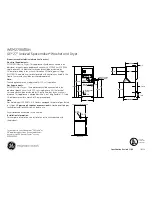
33
a. The pressure of the condensate in the steam supply will cause water hammer and subsequent heat
exchanger (steam coil) failure. The steam supply connection into the main supply line
must be
made
within a minimum 12-inch (30.48 cm) riser. This will prevent any condensate from draining towards the
dryer.
b. The steam supply piping to the dryer
must include
a 12-inch (30.48 cm) rise along with a drip trap and
check valve. This will prevent any condensate from entering the steam coil.
c. Flexible hoses or couplings
must be
used. The dryer vibrates slightly when it runs and this will cause the
steam coil connections to crack if they are hard piped to the supply and return mains.
d. Shutoff valves for each dryer
should be
installed in the supply, return, and drip trap return lines. This
will allow the dryer to be isolated from the supply and return mains if the dryer needs maintenance work.
e. Install an inverted bucket steam trap and check valve for each unit at least 12-inch (30.48 cm) below
steam coil as close to the coil as possible.
1) A trap with a capacity of 1,200 lbs (544 kg) of condensate per hour at 125 PSI (8.61 bars) is needed
for each unit.
f. A 3/4-inch (19.05 mm) vacuum breaker
should be
installed for each unit in the piping. This will prevent
the condensing steam from causing a vacuum inside the coil and possibly damaging the coil.
g. The supply and return lines
should be
insulated. This will save energy and provide safety for the
operator and maintenance personnel.
h. Water pockets in the supply line, caused by low points, will provide wet steam to the coil possibly
causing coil damage.
ALL
horizontal runs of steam supply piping
should be
pitched 1/4-inch (6.35 mm)
for every 1 foot (0.31 meters) back towards the steam supply header causing any condensate in the line
to drain to the header. Install a bypass trap in any low point to eliminate wet steam.
Summary of Contents for ML-130 II
Page 59: ...ADC 113314 1 06 21 01 25 ...
















































